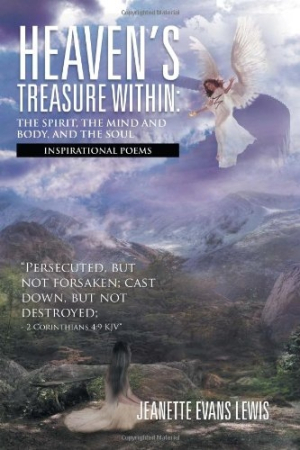Heaven's Treasure Within
The Spirit, the Mind and Body, and the Soul
Finding gratitude amid tragedy, this poet meditates on the earthbound spirit with sincere, humble verse.
Heaven’s Treasure Within is an earnest attempt to poetically illuminate the ways in which God is active in today’s world. Jeanette Evans Lewis, a mother who has felt a prophetic calling since childhood, offers more than a hundred free-verse poems in her first collection. Each meditates on how Christ is evinced not only in the gospel but also in people’s lives.
While the first poems in the collection have an apocalyptic edge, their second-coming focus gives way to the more earthbound meditations comprising the bulk of these pages. Lewis encourages readers away from materialism and toward humility as she expands upon Bible excerpts and promotes reflections of God in daily encounters.
Butterflies and raindrops allow us to reflect on divinity, she says. So do silver-lining situations: a coma may be an opportunity for rest, prison sentences an opportunity to hear testimonials, or momentary poverty a time to take account of what’s really important. The sincerity of delivery may give the spiritual boost the collection intends to deliver.
The poetry is strongest when it applies introspection to real-life challenges. In “Angel Babies,” the author addresses stillborn children: “thank you, angel babies, for preparing the way so we could find Jesus Christ through you.” Gratitude in the midst of tragedy is also found in “Two-Roomed Shack,” where, though “broken windows remain unfixed” and there is “no safety latch,” God’s eyes watch over a sleeping family; the troubled setting becomes a site for faith to grow.
Most topics are more vague. Poems borrow from biblical passages to extol the grandeur of God and God’s kingdom, praising the “gold and silver” of heavenly streets and marveling over luxe scriptural symbols, alabaster, royal gowns, and “beautifully scented perfumes.” The poems encourage limited attachment to this world, with the view that it simply precedes the next one.
But the message is obscured by frequent use of mixed metaphors and oblique symbolism: “wings of the cloud,” “golden glass spiral staircase,” “Heaven’s runway,” “apples of mercy, grapes of graces, and peaches of peace,” and Jesus as a trash can are less evocative than jarring. Malapropisms (“Franklin scent” for “frankincense,” Jesus “lying” in a manger) coupled with other editorial slips further complicate the poetry’s delivery.
When the poems address concrete topics, they are compelling and often moving. However, the reader must dig for them amongst the more common biblical abstractions in the collection, many of which lack clarity. The poems of Heaven’s Treasure Within too often read as imprecise, which may inhibit easy understanding. Nevertheless, these poems reflect heartfelt effort from a devout believer, and Lewis’s articulated desire to provide spiritual respite is genuine.
Reviewed by
Michelle Anne Schingler
Disclosure: This article is not an endorsement, but a review. The publisher of this book provided free copies of the book and paid a small fee to have their book reviewed by a professional reviewer. Foreword Reviews and Clarion Reviews make no guarantee that the publisher will receive a positive review. Foreword Magazine, Inc. is disclosing this in accordance with the Federal Trade Commission’s 16 CFR, Part 255.

